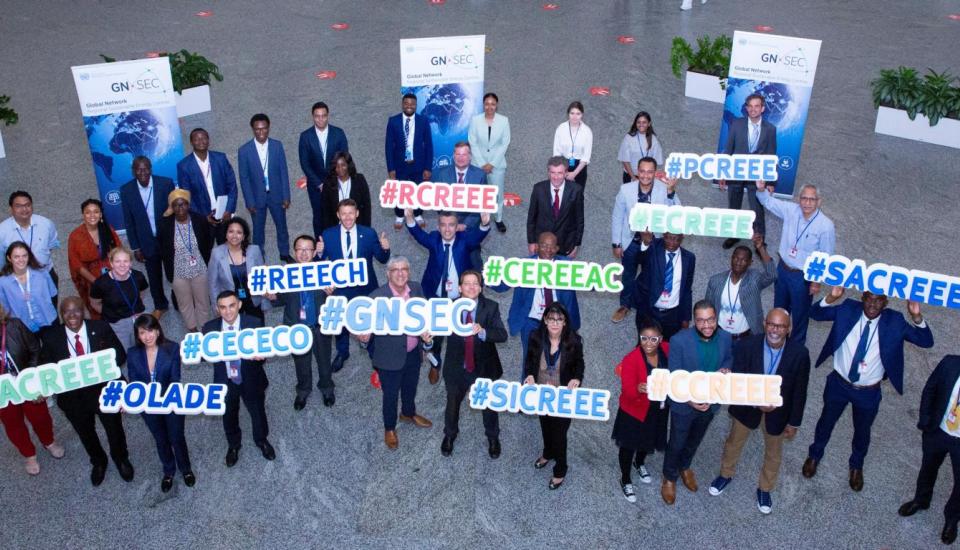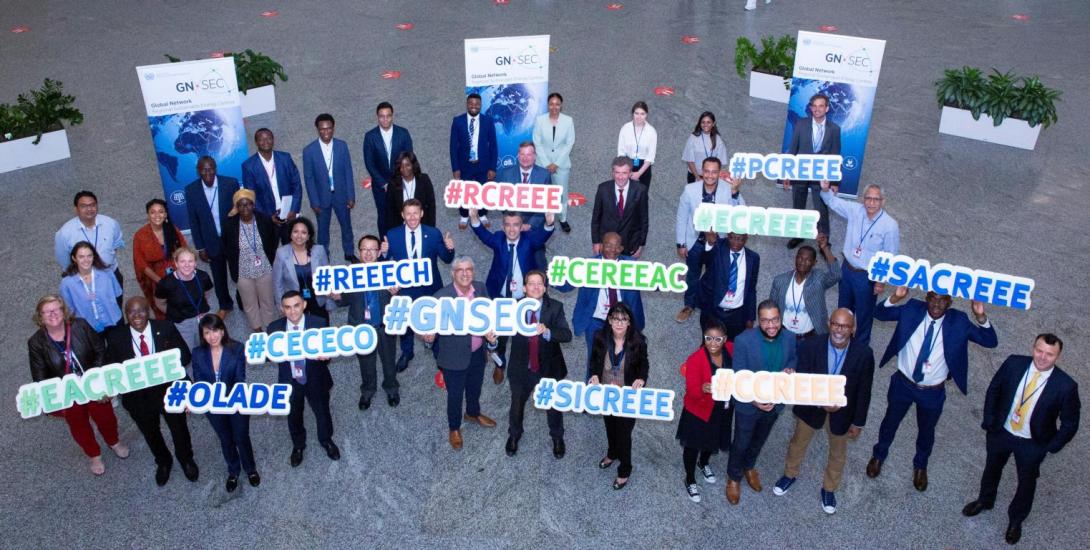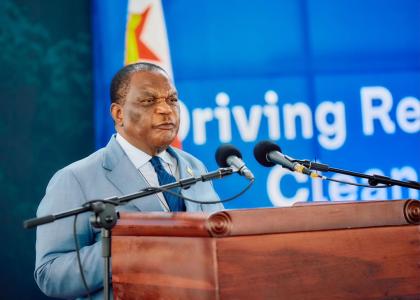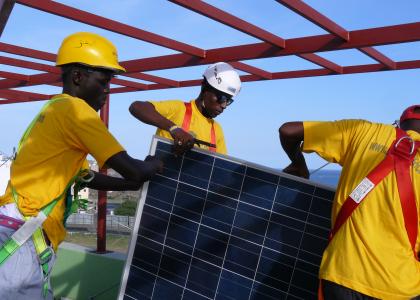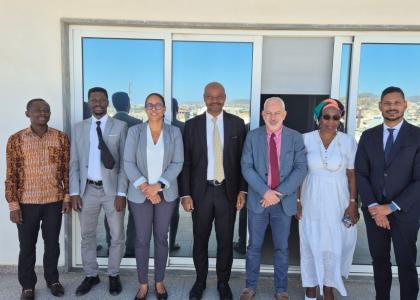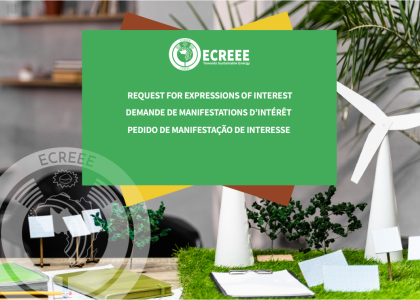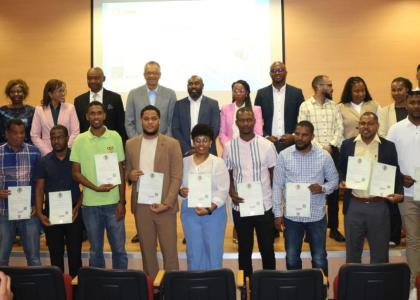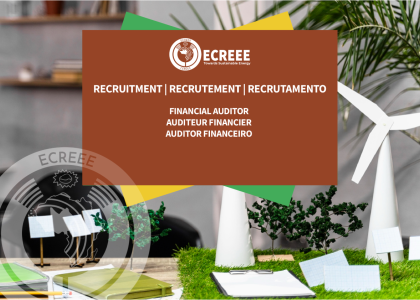Title: EACREEE Technical Expert
Requisition ID: 2619
Grade: ISA-Junior Specialist
Country: Uganda
Duty Station: Kampala
Category: International Consultant
Type of Job Posting: Internal and External
Employment Type: NonStaff-Regular
Contract Duration: 1 year with possibility of extension
Application Deadline: 21-Aug-2023, 11:59 PM (CEST)
Vacancy Announcement
TEMPORARY APPOINTMENT OF PROJECT PERSONNEL
Female candidates are particularly encouraged to apply.
ORGANIZATIONAL CONTEXT
The United Nations Industrial Development Organization (UNIDO) is the specialized agency of the United Nations that promotes industrial development for poverty reduction, inclusive globalization and environmental sustainability. The mission of UNIDO, as described in the Lima Declaration adopted at the fifteenth session of the UNIDO General Conference in 2013 as well as the Abu Dhabi Declaration adopted at the eighteenth session of UNIDO General Conference in 2019, is to promote and accelerate inclusive and sustainable industrial development (ISID) in Member States. The relevance of ISID as an integrated approach to all three pillars of sustainable development is recognized by the 2030 Agenda for Sustainable Development and the related Sustainable Development Goals (SDGs), which will frame United Nations and country efforts towards sustainable development. UNIDO’s mandate is fully recognized in SDG-9, which calls to “Build resilient infrastructure, promote inclusive and sustainable industrialization and foster innovation”. The relevance of ISID, however, applies in greater or lesser extent to all SDGs. Accordingly, the Organization’s programmatic focus is structured in four strategic priorities: Creating shared prosperity; Advancing economic competitiveness; Safeguarding the environment; and Strengthening knowledge and institutions.
Each of these programmatic fields of activity contains a number of individual programmes, which are implemented in a holistic manner to achieve effective outcomes and impacts through UNIDO’s four enabling functions: (i) technical cooperation; (ii) analytical and research functions and policy advisory services; (iii) normative functions and standards and quality-related activities; and (iv) convening and partnerships for knowledge transfer, networking and industrial cooperation. Such core functions are carried out in Departments/Offices in its Headquarters, Regional Offices and Hubs and Country Offices.
The Directorate of Technical Cooperation and Sustainable Industrial Development (TCS), headed by a Managing Director, oversees the Organization's development of capacities for industrial development as well as industrial policy advice, statistics and research activities and the Organization's normative contribution to Member States and global development community in achieving the SDGs. The Directorate also ensures the application of strategies and interventions for sustainable industrial development related to Environment, Energy, SMEs, Competitiveness and Job creation, as well as Digitalization and Artificial Intelligence. Through coordination in-house and with Member States and industry stakeholders, it ensures that the services provided in these areas contribute toward effective and appropriate technical, business and policy solutions and are focused on results and on realizing any potential for scaling up and positioning UNIDO as a leading platform for industrial development in developing countries and global fora.
The Directorate houses the technical Divisions of Capacity Development, Industrial Policy Advice and Statistics (TCS/CPS); Circular Economy and Environmental Protection (TCS/CEP); Decarbonization and Sustainable Energy (TCS/DSE); SMEs, Competitiveness and Job Creation (TCS/SME); and Digital Transformation and AI Strategies (TCS/DAS). The Directorate also ensures close coordination and collaboration among the Divisions as well as with relevant entities in the Directorate of Global Partnerships and External Relations (GLO) and the Directorate of SDG Innovation and Economic Transformation (IET).
The Division of Decarbonization and Sustainable Energy (TCS/DSE) assists Member States in the transition to a sustainable energy future through the application of renewable energy solutions for productive uses, adoption of the efficient concepts of energy use by industry and the introduction of low-carbon technologies and processes. In transitioning to a sustainable energy future, the challenges of addressing energy poverty and climate change are an integral part of the Division's activities, as is the dissemination of relevant knowledge and technologies and paths to plan, manage and finance the energy transition. It collaborates closely on relevant and converging issues with the Climate and Technology Partnerships Division (IET/CTP) and analytical and strategic matters with TCS/CPS and ODG/SPU.
The position is located under Energy Systems and Decarbonization Unit (TCS/DSE/ESD) which focuses on promoting sustainable energy solutions and infrastructure for industrial development. It promotes industrial decarbonization through crosscutting solutions, such as optimized energy management systems and the deployment of renewable energy technologies. Bringing together the supply and demand side for disruptive energy solutions, both technical and business related, the Unit fosters transformative change on the system level driven by the convergence of key technologies such as distributed generation, digitization and storage. The Unit is also responsible for coordinating dialogues and partnerships at national, regional and global levels to promote disruptive energy solutions and shape policy change for this. Finally, the Unit positions UNIDO strategically in the global energy and climate change forums and coordinates the Global Network of Regional Sustainable Energy Centres and related partnerships.
PROJECT CONTEXT
Technical Support for the Second Operational Phase of the East African Centre for Renewable Energy and Energy Efficiency (Project ID 200110)
The 2nd support phase of UNIDO follows-up on the project “Establishment and First Operational Phase of the East African Centre for Renewable Energy and Energy Efficiency (EACREEE)”, which was implemented in partnership with the EAC Secretariat between 2013 and 2019. UNIDO moderated the complex intergovernmental decision-making process and provided services for institution-building and technical program development under the Global Network of Regional Sustainable Energy Centres (GN-SEC) Programme. The 2nd support phase is based on the findings of an undertaken external mid-term review, SWOT and PESTLE analysis of EACREEE.
The assessments have confirmed the continuing relevance and value proposition of EACREEE. They draw positive conclusions about the achievements and performance of the centre. EACREEE has full legal identity as EAC Centre of Excellence, hosted by the Makerere University College of Engineering, Design, Art and Technology (CEDAT) in Kampala, Uganda. Its’ governance structure and rules and procedures are fully operational. Over the past years, the centre has built up a network of national focal institutions and various international partnerships. EACREEE has implemented initial technical activities and developed a project pipeline. The centre is well-connected to EAC processes and an active member of the GN-SEC.
However, the external reviews also revealed several shortcomings and risks, mainly related to the legal status and weak resource and technical capacity base of the centre. It has not developed its full potential. Lengthy discussions between EAC Partner States on the legal status of the centre led to significant delays and impacted negatively on the resource base and fund-raising abilities of EACREEE. The initial objective to establish the centre as full-fledged institution of the EAC has not been achieved. The current legal status of EACREEE as centre of excellence based on Ugandan law comes with some bottlenecks for its regional operations. Up to now, EAC Partner States are not paying membership fees.
Therefore, the overall objective of the 2nd support phase is to prepare the centre for full autonomy and long-term sustainability. During the project period, the centre will expand its programme portfolio and become a regional and international hub for RE&EE issues and solutions. The centre will increase its project implementation rate and develop joint programs with the other GN-SEC centres. International partnerships will leverage significant co-finance for the activities of the centre. The project will support EACREEE to transit to a full EAC institution and a sustainable funding model, which will include membership contributions of the EAC Partner States.
Therefore, currently the centre is strengthening its technical and administrative staff capacities. In this context, UNIDO is recruiting an EACREEE Technical Expert, to be located at the EACREEE Secretariat in Kampala, Uganda. It shall be noted, that UNIDO looks for new innovative experts, who have so far not worked in the centre. Further information on the project is available at: www.eacreee.org and www.gn-sec.net.
FUNCTIONAL RESPONSIBILITIES
Under the supervision of the UNIDO Project Manager and his team in UNIDO HQ and in close cooperation with the Interim Executive Director (IED), the EACREEE Technical Expert (ETC) will contribute to the successful implementation of the 2nd operational phase of the Centre. The ETC will establish an excellent relationship with the IED and the other team colleagues and contribute to the smooth coordination of energy matters with the EAC Secretariat, other regional bodies (e.g. EAPP), EAC Partner States and international partners. Specifically, the expert will have the following duties and responsibilities:
1. Contribute to the overall organizational development and local coordination
- Assist the EACREEE IED on issues related to organizational development and the strategic positioning of the centre within regional and international renewable energy and energy efficiency landscape;
- Support the IED in coordinating with the Government of Uganda, particularly the Ministry of Energy, on EACREEE matters and potential support to the centre. Moreover, assist the IED to solve the existing institutional issue under the existing EAC and hosting arrangement;
- Assist in the preparations of missions of the core partners (e.g. EAC, UNIDO, etc.) to Uganda in close coordination with the UNIDO office in Kampala;
- Assist the IED in the implementation of the EACREEE administrative and financial rules and procedures in line with the established fiduciary standards;
- Assist the UNIDO PM in monitoring the implementation of funding contracted by UNIDO to EACREEE under an established sub-contract;
- Contribute to the development and implementation of the EACREEE annual work plans, budgets and progress reports;
- Assist the IED in the development of a resource mobilization strategy and pro-actively approach donors and environmental institutional funds; support the IED in coordinating closely with UNIDO and other partners on funding opportunities, including bilateral donors, EU, GEF and GCF;
- Assist the IED to the strengthening of the monitoring system and tracking framework to measure the performance and impact of EACREEE in line with the established indicators in the results framework of the UNIDO project document and the EACREEE Business Plan;
- Assist the IED in coordinating with the NFIs and THs and contribute to the organization of the regular meetings of the Technical Advisory Committee (TAC) and Board of Directors (BoD); as delegated by the IED follow-up on taken decisions;
- Contribute to relationship building with the EAC Secretariat and a broad range of national, regional and international public and private partners;
- Assist the IED in mainstreaming gender activities throughout the technical activities of the centre;
- Provide support to external auditors and evaluators assigned to monitor the transparency, accountability and performance of the centre and facilitate the implementation of follow-up actions;
- Participate in bi-weekly meetings with the UNIDO PM and his team; submit a quarterly overview on implemented activities; assist in developing the UNIDO progress reports to the donor.
2. Contribute to the development, implementation and monitoring of renewable energy and energy efficiency activities
- Contribute to quality assurance throughout the project cycle of a wide range of different EACREEE activities (e.g. trainings, conferences, policy activities, co-funding of projects); develop a quality and appraisal framework for supported technical activities, including gender aspects, environmental and social safeguards;
- Advice the NFIs and key stakeholders of the EAC region on renewable energy and energy efficiency technology characteristics, economics, solutions, policies and business models; review prepared documents and provide guidance; undertake extensive research on various topics as required;
- Support the UNIDO PM and IED in the development of new EACREEE programs and projects, covering a broad range of countries, technologies and areas of intervention, including capacity and policy advisory, knowledge management, quality infrastructure, investment and business promotion;
- Assist IED and UNIDO PM in the execution of the annual work plans, related programs, projects, technical activities and key events as required; contribute to the creation of a team-work culture, create linkages, synergies and cost-sharing arrangements;
- Support in establishing links to donors and financial institutions regarding grant, loan and equity financing for RE&EE investment projects and programs in the EAC region; actively create synergies with UNIDO programs and projects in this context (e.g. GCIP, PFAN, BLOOM, IDDI, Oyo centre, GEF/GCF projects in Congo and STP);
- Pro-actively engage in joint south-south and triangular projects and initiatives of the GN-SEC platform in partnership with other regional centres; as far as possible participation in the annual GN-SEC Steering Committee meetings;
- Elaborate terms of references (TORs) and technical specifications for hardware procurements and consultancy assignments, which require extensive research, data collection and communication with local stakeholders of the relevant sectors (e.g. transport, buildings, industry); once contracted, contribute to the effective coordination of consultants and hardware suppliers;
- Support contracted external consultants in the development of a broad range of baseline assessments, studies and analytics by providing background research, field data collection, and baseline studies; assist external consultants in the drafting of various RE&EE regulations;
- Support the organization of a broad range of regional conferences, workshops and trainings; prepare agendas, concept notes, budgets, minutes and reports as required; such events envisage 50% women participation;
- Arrange regular (online) meetings with the regional energy bodies (e.g. EAPP), the EAC Commission, the NFIs and THs.
3. Advocacy, knowledge management and communication
As delegated by the EACREEE IED and UNIDO PM, represent the centre and raise awareness on renewable energy and energy efficiency opportunities in the EAC region as well as on international levels; from time to time, as authorised by the IED and UNIDO PM, the expert will travel to East Africa and international key events to participate in conferences and workshops;
- Contribute to the development of timely policy inputs and briefs for EAC to be considered in international energy and climate processes (e.g. COP, SDGs, etc.); advocate for a just and inclusive energy transition addressing particularly the needs of LDCs;
- Coordinate closely with UNIDO on SDG-9 relevant positions; contribute to the preparation of the regular meetings of EAC energy ministers and heads of state; prepare relevant speaking notes and speeches for the IED;
- Contribute to the further development of the EACREEE website and the public relation and knowledge management activities of the Centre (e.g. regular newsletters, social media tweets); establish a contact network of like-minded journalists within the region;
- Prepare contents for EACREEE knowledge management activities and regional (social) media campaigns on RE&EE priorities issues within the region; establish and maintain technical blogs as feasible and useful;
- Assist the IED in the planning and establishment of the GIS based EAC energy information system by considering the lessons learned and best practices of other GN-SEC centres and internationally; contribute to a smart indicator framework facilitating gender-sensitive energy planning and tracking of progress towards RE/EE; contribute to the establishment of a regional data gathering system and network;
- Actively inform EACREEE stakeholders on new innovations in the RE&EE sector and advice on the establishment of international partnerships with industry and science to facilitate knowledge transfer and institutional innovation;
- Contribute to the establishment of a EACREEE RE&EE contact network (e.g. focal points, private sector) regionally and internationally.
MINIMUM ORGANIZATIONAL REQUIREMENTS
Education: Advanced university degree in energy (policy, economics or engineering) is required; special focus or additional qualification in renewable energy and/or energy efficiency is desirable.
Technical and Functional Experience:
- At least three (3) years of work experience in technical positions in the energy or electricity sector in one or several countries of the East African Community (EAC) is required.
- Good knowledge of the urban and rural energy challenges of the EAC region is required.
- Demonstrated knowledge of renewable energy and energy efficiency technology characteristics, economics, policies, incentives and business models is required.
- A good contact network to key energy institutions, utilities, universities and private sector in the EAC is desirable.
- Experience in international development cooperation and coordination with development partners, including the United Nations (UN) and development banks, is desirable.
- Good analytical writing, presentation and communication skills are required. The application shall show-case a track-record of written project concepts or reports.
- Proficiency in Microsoft processing software (e.g. word, excel) is required.
- Demonstrated understanding of gender equality and women’s empowerment in the field of energy, as well as the interconnections between energy and sustainable development.
- Ability to work under pressure and handle politically and culturally sensitive issues in a diplomatic manner.
Languages: Fluency in written and spoken English is required. Working knowledge of French and another official UN languages is desirable.
All applications must be submitted online through the Online Recruitment System. Correspondence will be undertaken only with candidates who are being considered at an advanced phase of the selection process. Selected candidate(s) may be required to disclose to the Director General the nature and scope of financial and other personal interests and assets in respect of themselves, their spouses and dependents, under the procedures established by the Director General.
Visit the UNIDO website for details on how to apply: www.unido.org. Link: https://careers.unido.org/search/?createNewAlert=false&q=&optionsFacetsD...
NOTE: The Director General retains the discretion to make an appointment to this post at a lower level.
Notice to applicants:
UNIDO does not charge any application, processing, training, interviewing, testing or other fee in connection with the application or recruitment process. If you have received a solicitation for the payment of a fee, please disregard it. Vacant positions within UNIDO are advertised on the official UNIDO website. Should you have any questions concerning persons or companies claiming to be recruiting on behalf of UNIDO and requesting payment of a fee, please contact: recruitment@unido.org

